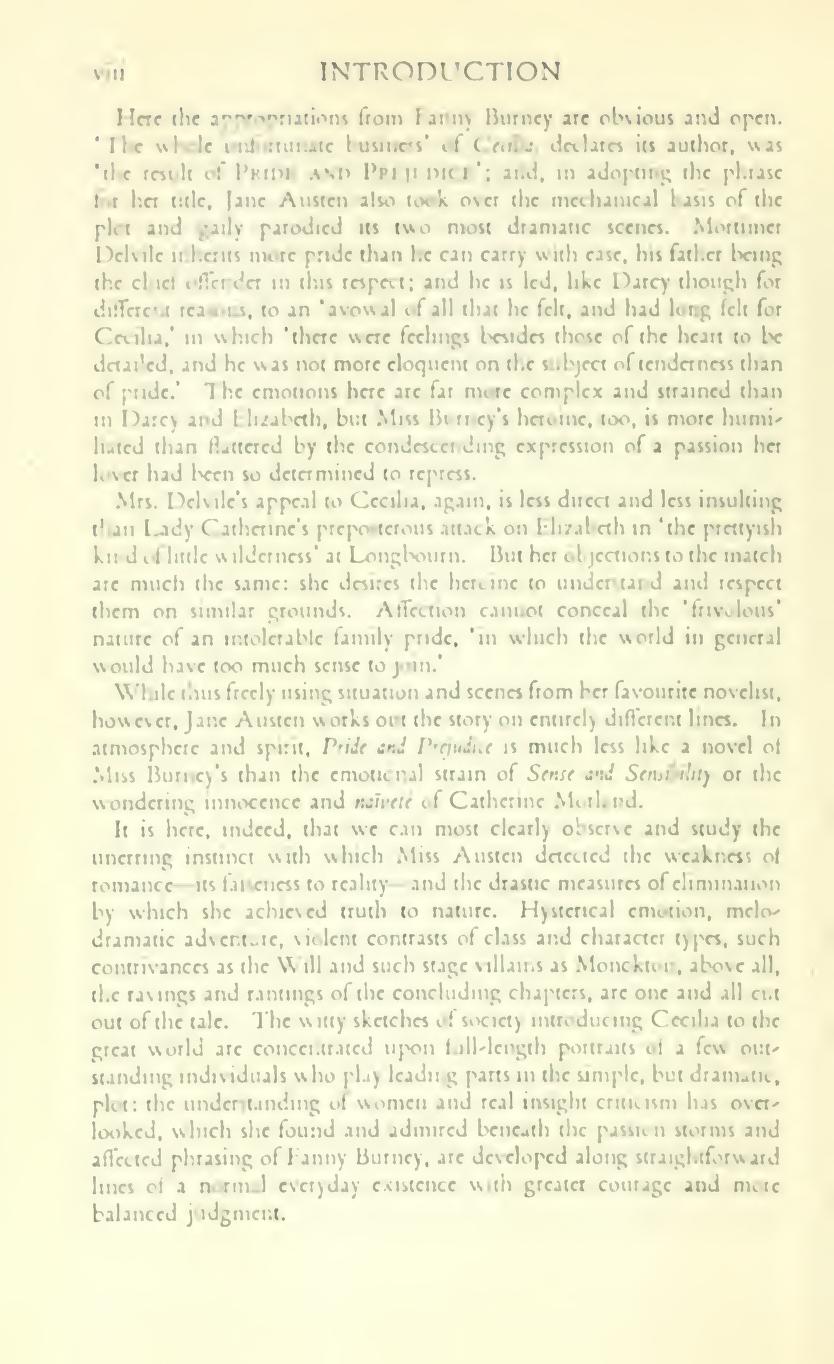 ............prev.....................next
............prev.....................next{{prxprf008.jpg}} || vvii INTRODUCTION
Hnc die a^rYnfrution* from farm Bnrncy arc obvious and open.
'lie \0 Ic i til ttmuKc \ usn.rs' if ( ttfik deviates its author, was
M c rest It of Pkipi,\mi Ppi |i pic I '; and, in adopting ilic phrase
It her t:dc, |anc Austen alio dxk o\cr the mechanical I asis of the
pli t and {'•iily parodied its two most dramatic scenes. Mortimer
Dclvilc 11 I. cms mute pride than l.c can carry with case, his father being
the cl ict I'lTrt dn in tins tcspat; and lie is led, like Darcy though for
dilTcrct rca«»iis, to an 'avowal of all that he felt, and had long felt for
Ccuha,' in which 'there were feelings besides those of the heart to he
dctai'cd, and he was not more eloquent on (he s.hject of tenderness than
o( pride.' 1 he emotions here arc far mi-re complex and strained than
in Darcy and I h/ahcth, but Miss Bi n cy's heroine, too, is more humi'
h-tcd than fluttered by the condescci ding expression of a passion her
h vcr had been so determined to repress.
Mrs. Pclv lie's appeal to Cecilia, again, is less direct and less insulting
l 1 an Ijdy Catherine's preposterous attack on Hi/al cth in 'the prettyish
kn d il little « ildcmcss' at Longhomn. But her ol jcctions to the match
are much the same: she desires the hcrunc to under tat J and respect
them on similar grounds. A flection cannot conceal the 'fnvJous'
nature of an intolerable family pride, 'in which the world in general
would have too much sense to j -in.'
While ihus freely using situation and scenes from her favourite novelist,
however. Jane Austen works on (he story on entirely different lines. In
atmosphere and spirit, P'iJf cr.i P'ciuJue is much less like a novel ot
Miss Buncy's than the emoticral strain of Sense a**/ Semi iht) or the
wondering innocence and mh-eie if Catherine Mill. nd.
It is here, indeed, that we can most clearly observe and study the
unerring instinct with which Miss Austen detected the weakness ol
romance its lateness to reality and the drastic measures of elimination
by which she achieved truth to nature. Hysterical emotion, mclcv
dramatic advcr.t„ie, violent contrasts of class and character types, such
contrivances as the Will and such stage villains as Moncku r, above all,
the ravings and ranting* oftlie concluding chapters, arc one and all cr.t
out of the tale. The witty sketches if society introducing Cecilia to the
great world arc concentrated upon fill-length portraits i??! a few out'
standing individuals who phiy lcadit g pans in the simple, but draniata,
pkt: the under landing ol women and real insight critiusm has over'
looked, which she found and admired bencith the passu n storms and
affected phrasing of I anny Bumcy, are developed along straightforward
lines oi a n rmJ everyday existence with greater courage and nuic
balanced j idgmcnt.
[[viii]]